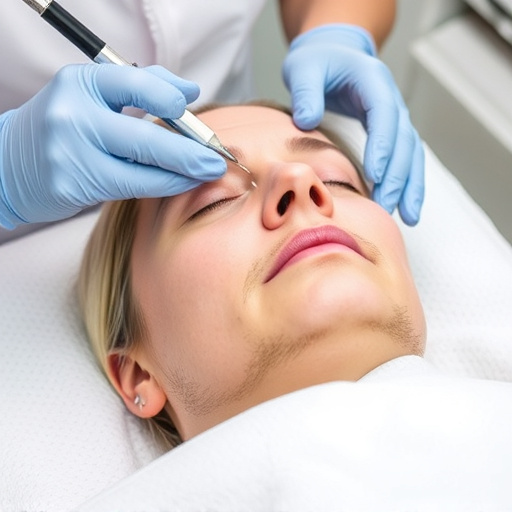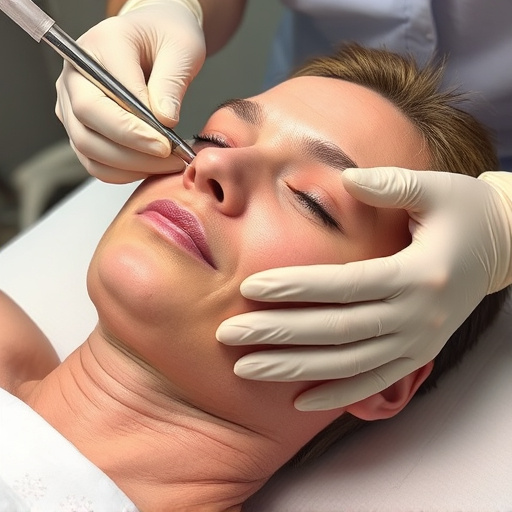Melasma, a hormonal skin condition causing dark facial patches, requires a careful treatment approach. Non-invasive methods like topical creams and chemical peels are popular. Acne treatments and specialized facial therapies targeting melanin offer promising solutions. Diagnosis involves medical history, physical exams, and advanced tests confirming hormone imbalances. Personalized skincare combines non-surgical treatments with anti-aging practices. Advanced melasma treatments include retinoids, laser therapy, and sun protection, with severe cases managed through precise skin rejuvenation procedures.
Melasma, often referred to as ‘mask of pregnancy,’ is a skin condition characterized by dark patches on the face. While hormonal fluctuations are a significant factor, understanding this link is key to effective melasma treatment. This article delves into the intricate relationship between hormones and melasma, exploring diagnostic methods for hormone imbalances and highlighting targeted treatments that offer promising insights for managing and alleviating this cosmetic concern. Discover practical steps towards achieving clear, radiant skin.
- Understanding Melasma: Hormonal Connections
- Diagnosing Hormone Imbalances in Melasma
- Targeted Treatments for Effective Melasma Management
Understanding Melasma: Hormonal Connections

Melasma, characterized by dark patches on the face, is a skin condition that often leaves individuals concerned about its aesthetic impact. Understanding melasma involves delving into its hormonal connections. This complex skin issue is closely linked to fluctuations in hormone levels, particularly during pregnancy and menopause. The surge or drop in hormones like estrogen and progesterone can trigger melanin production, leading to the appearance of these discoloration spots.
While it may seem straightforward, treating melasma requires a nuanced approach, especially considering its hormonal underpinnings. Non-surgical treatments, such as topical creams and chemical peels, are popular options for those seeking a more gentle approach. Acne treatments have also shown promise in managing melasma by addressing underlying inflammation. Moreover, specific facial treatments tailored to target melanin production can offer effective melasma treatment solutions without invasive procedures.
Diagnosing Hormone Imbalances in Melasma

Diagnosing hormone imbalances in melasma involves a comprehensive approach due to the complex interplay between hormones and skin health. Dermatologists often start with a detailed medical history, probing for any recent or ongoing hormonal changes, such as pregnancy, childbirth, or menopause. This is crucial in identifying potential culprits like estrogen and progesterone fluctuations. Physical examinations are also key, focusing on the presence of other symptoms associated with hormone imbalances, such as irregular periods, weight changes, or skin issues like acne or hair loss.
Advanced diagnostic tools may be employed to confirm suspected hormone imbalances. Blood tests can measure hormone levels, while imaging studies might be used to exclude any underlying conditions. Once diagnosed, personalized skincare becomes essential for melasma treatment. Non-surgical treatments, including topical therapies and targeted light therapy, offer effective solutions without invasive procedures. Moreover, anti-aging treatments that address collagen stimulation and skin rejuvenation can complement hormonal management, providing comprehensive care for melasma patients.
Targeted Treatments for Effective Melasma Management

Melasma treatment has evolved to include targeted approaches that address the hormonal influences behind this condition. Beyond general skin care routines, specialized medical spa services offer a range of effective melasma treatment options. Anti-aging treatments such as retinoids, chemical peels, and microdermabrasion can help reduce hyperpigmentation, while targeted therapies like vitamin C serums and hydroquinone creams inhibit tyrosinase activity, breaking down melanin production.
For more severe cases or those resistant to conventional methods, advanced skin rejuvenation procedures may be considered. Laser therapy, for instance, utilizes specific light wavelengths to target melanin-containing cells, offering precise melasma treatment without damaging surrounding skin. Combining these targeted treatments with a comprehensive skincare regimen and sun protection can significantly improve melasma appearance and prevent recurrence.
Melasma, often referred to as ‘mask of pregnancy’, is a skin condition with a complex hormonal link. By understanding the connection between hormones and melasma, we can effectively diagnose and treat this aesthetic concern. Targeted treatments, including hormonal therapies and topical medications, offer promising insights into melasma management. Early intervention and tailored care are key to achieving clearer, healthier skin, providing individuals with lasting solutions for their melasma treatment journey.














